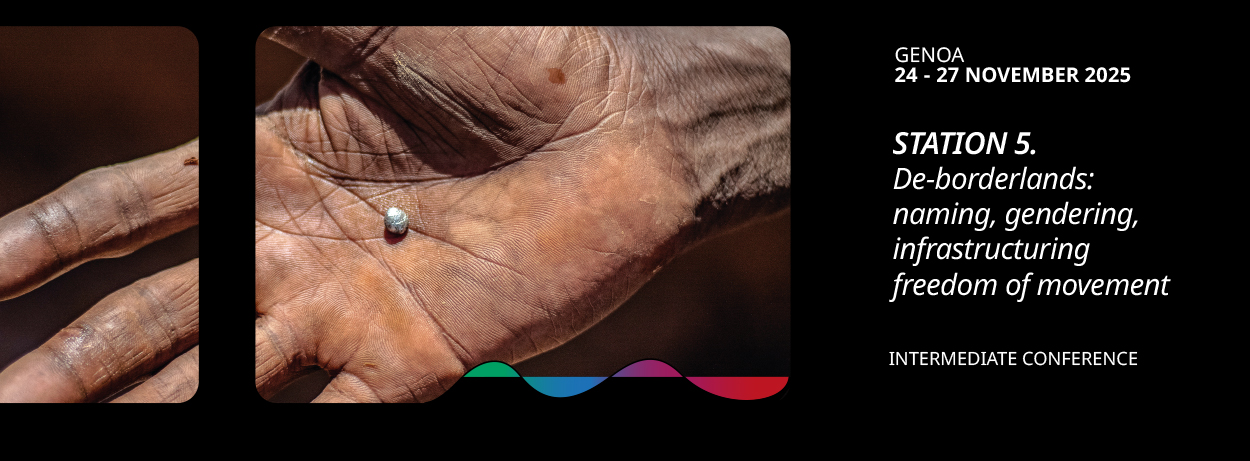Station 5
24 November - 27 November 2025
STATION 5 – ERC SOLROUTES INTERMEDIATE CONFERENCE
De-borderlands: naming, gendering, infrastructuring freedom of movement
Genoa, Italy
In recent decades, academic research on migration has increasingly moved beyond methodological nationalism. Within this shift, solidarity has emerged as both a normative ideal and an empirical object, animated by various actors – namely, migrants, activists, kinship networks, grassroots movements, and NGOs – operating across different terrains, sites and scales. However, solidarity is far from a stable or universal category; rather, it is a contested and dynamic field of social action and meaning, deeply embedded in languages, gendered social relations, and cultural, social, and material infrastructures. We suggested to conceive solidarity through the lens of a materialistic approach: during almost two years of ethnographic fieldwork across North and Western Africa, the Balkans and Mediterranean areas, SOLROUTES researchers have tried to explore how solidarity as a circulating energy opens routes and de-bordering opportunities, facing harshening constraints of border policies and technologies.
The intermediate conference has been convened in response to the necessity for a plural and situated theorisation of solidarity, grounded in the lived experiences of those who inhabit, resist, and navigate migration routes. Furthermore, the aim is to present intermediate outcomes of the project entering into a theoretical and methodological conversation with colleagues and scholars working on similar topics.
The full conference programme, the book of abstracts and the artistic events programme (Italian language) are available for download: Programme, Book of Abstracts, and Artistic Events (Italian Language)
NAMING AND GROUNDING SOLIDARITY
The first thematic axis interrogates solidarity and routes' semantic and epistemological foundations. Rather than taking these concepts for granted as ethical universals, we call for analyses that explore the emic vocabularies, hidden transcripts, and discursive practices by which mobile subjects define their experiences, allies, risks, and modes of assistance. How do migrants themselves name the social relations and strategies that sustain their trajectories? What terms emerge across different cultural and linguistic contexts to describe collective agency and mobility? Inspired by Wittgenstein’s idea of “family resemblances” and Marcus’s travelling ethnographies, this axis encourages contributions that follow words, idioms, and naming practices as epistemic traces of solidarity in motion.
GENDERING SOLIDARITY
The second axis invites contributions that analyse and frame the relationship between migration, borders’ materiality and solidarity through a gendered lens. We particularly welcome papers investigating gendered solidarity networks and practices, and how gendered subjectivities – particularly those who identify as women – shape and are shaped by migration trajectories, as well as the transformative impact of migration on intimate relations, family structures, and caregiving practices.
INFRASTRUCTURING SOLIDARITY
The third axis focuses on migration infrastructures and the politics of infrastructuring. Moving beyond a narrow understanding of infrastructure as material or institutional apparatus, we welcome papers focusing on a relational and processual approach that views infrastructures as battlegrounds where mobility and control, emancipation and exploitation, coexist and collide. Contributions investigate how solidarity is embedded or confronts infrastructures at multiple scales: macro, meso, and micro. Special attention will be given to subaltern solidarities – informal networks initiated by migrants – and abolitionist solidarities, which oppose securitised migration management through radical infrastructural alternatives.
ARTISTIC EVENTS
Solroutes is a sociology project that also draws on the expressive power of art. Sociological research and artistic exploration intertwine to collect and convey the stories and voices of migrants we encounter in our practices—through their difficult and dramatic journeys, and in the constantly provisional places they inhabit. Over the past two years, we have explored multiple languages of expression—ethnography, writing, photography, documentary, music, illustration, theatre, and contemporary art—in order to build a plural and shared perspective.





